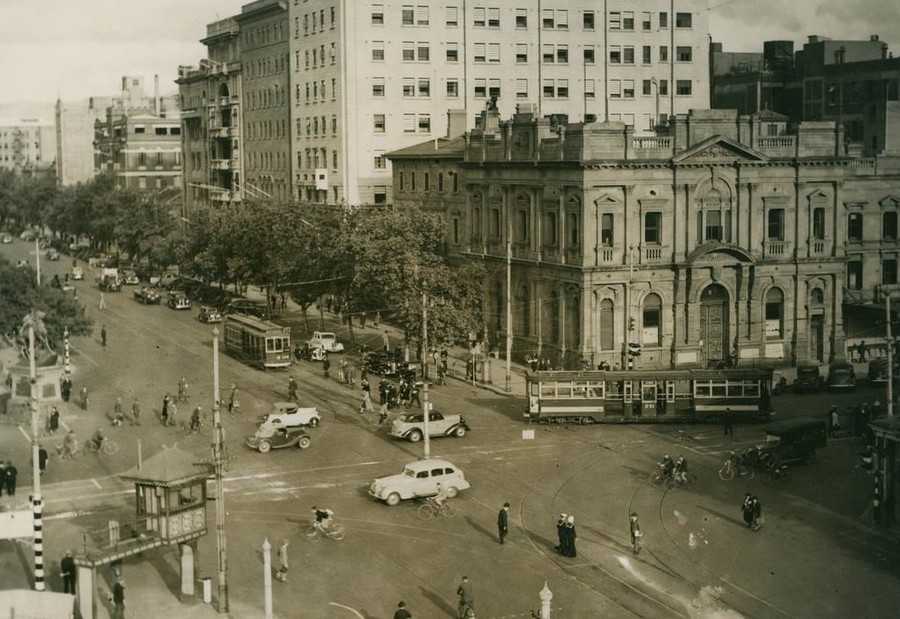Six Achievements from South Australia's Distinctive History
With the launch of Paul Sendziuk and Robert Foster's provocative A History of South Australia we look at Adelaide's past

Visitors to South Australia will frequently encounter some of the loud boasts that locals like to lay claim to: the first state to grant women the right to vote, to have the secret ballot, to legalise unions and to decriminalise homosexuality
These claims play into a cultural mythos of a historically progressive state which justifies Adelaide’s status as the festival city: a natural home to cultural enlightenment. A recently published A History of South Australia by Paul Sendziuk and Robert Foster gives us a chance to revisit some of these claims, unearth a few new ones, and explore some under-examined aspects of South Australia’s past.
Censoring and Dismembering
The inaugural Adelaide Festival of Arts was marked by controversy when performer Lyell McEwin was prevented from performing five of his songs, including 'I Hold Your Hand in Mine', about a man who cuts off his girlfriend’s hand and carries it around. Morbid humour might be a mainstay of the festivals these days, but back in 1960 police officers had to be stationed about the venue to ensure McEwin didn’t corrupt public morals with his darkly humorous ditty.
Torrens Title
Conveyancing may not be the sexiest topic, but this legal reform of land distribution, which was one of the earliest pieces of legislation ratified by the South Australian parliament, has adherents all over the world. The simple system of keeping a register of all land title claims revolutionised the exploitable common law system which existed before it, and went on to be widely adopted throughout the Commonwealth (and, to a lesser extent, the world, including several US states).
Women's Work in World War II
South Australia had its fair share of Rosie the Riveters during World War II. Sydney and Fremantle were deemed to be unsuitable locations for munitions production, being vulnerable to attack, and so SA became host to three munitions factories which readily employed all capable women (although for as little as 60% pay). However, when the Womens Employment Board granted South Australian women the right to serve drinks in bars, a year-long morality debate was waged over whether it was appropriate for women to work in an environment where they might be exposed to drunkenness, men and sex. The matter was only resolved when male bar-workers were forced to find new work, bringing women into the occupation out of necessity.
South Australia’s Founders Ignored Multiple Opportunities for Treaty
When the colony of South Australia was still in its planning stages, and in the wake of the near annihilation of Aboriginal peoples in Tasmania, Governor Arthur offered the following advice to the colony’s planners: ‘every effort … ought to be made, to come to an understanding with the natives and compensate them for any loss of land.'
The British Colonial Office, heeding these words, pressured the members of the South Australian Colonisation Commission to guarantee the sovereign rights of Aboriginal peoples already living in the territory. In response, Robert Torrens, the chair of the commission, threatened to scuttle the entire endeavour if it was insisted that Aboriginal land rights were to be upheld. The Colonial Office ultimately backed down, and when the matter of Aboriginal land rights came up again in disputes over land surveys in 1840, and under prodding from the British Government in the 1860s, South Australian governors continued to neglect the opportunity to enter into Treaty with Aboriginal peoples, insisting that they were ‘too little advanced’ to enter into any agreement.
Women’s Suffrage
South Australia can lay claim to being the first state in Australia to grant women, including Aboriginal women, the right to vote and stand in parliament in 1894. However, this isolated fact does not capture how much resistance there was to the concept. A similar, more modest attempt to introduce women’s suffrage had failed in 1886, and the amendment to allow women to stand in parliament was only added because its opponents hoped that by including it they would sink the entire Bill. And so, though the provision got up, South Australia ended up being the last state in the country to actually elect a woman to parliament.
Public Holidays
When Mark Twain visited South Australia in 1895, his view was that the state had an 'un-English mania for holidays… mainly workingmen’s holidays.' This is a reflection of the fact that, two decades earlier, a coalition of trade unions had successfully campaigned for the right to strike in South Australia – another first for the country – and how the eight-hour day, and the Saturday half-holiday, had been secured by industrial action. Along with a decidedly strong aversion for working or playing sport on Sunday, this gives South Australians a reasonably strong claim for the invention of the weekend.
Further Reading: Fort, Carol. “State vs Federal Government in the ‘Barmaids’ Case: Regulating Australia’s Second World War Home Front”, Australian Journal of Politics and History: Volume 62, Number 1, 2016, pp.16-29. Sendzuik, Paul and Foster, Robert, A History of South Australia. Cambridge, Cambridge University Press, 2018.
 Floods of Fire with Electric Fields & the ASO
Floods of Fire with Electric Fields & the ASO
 Review: Time Machine
Review: Time Machine
 Review: Antigone in the Amazon
Review: Antigone in the Amazon
 Review: I Hide in Bathrooms
Review: I Hide in Bathrooms